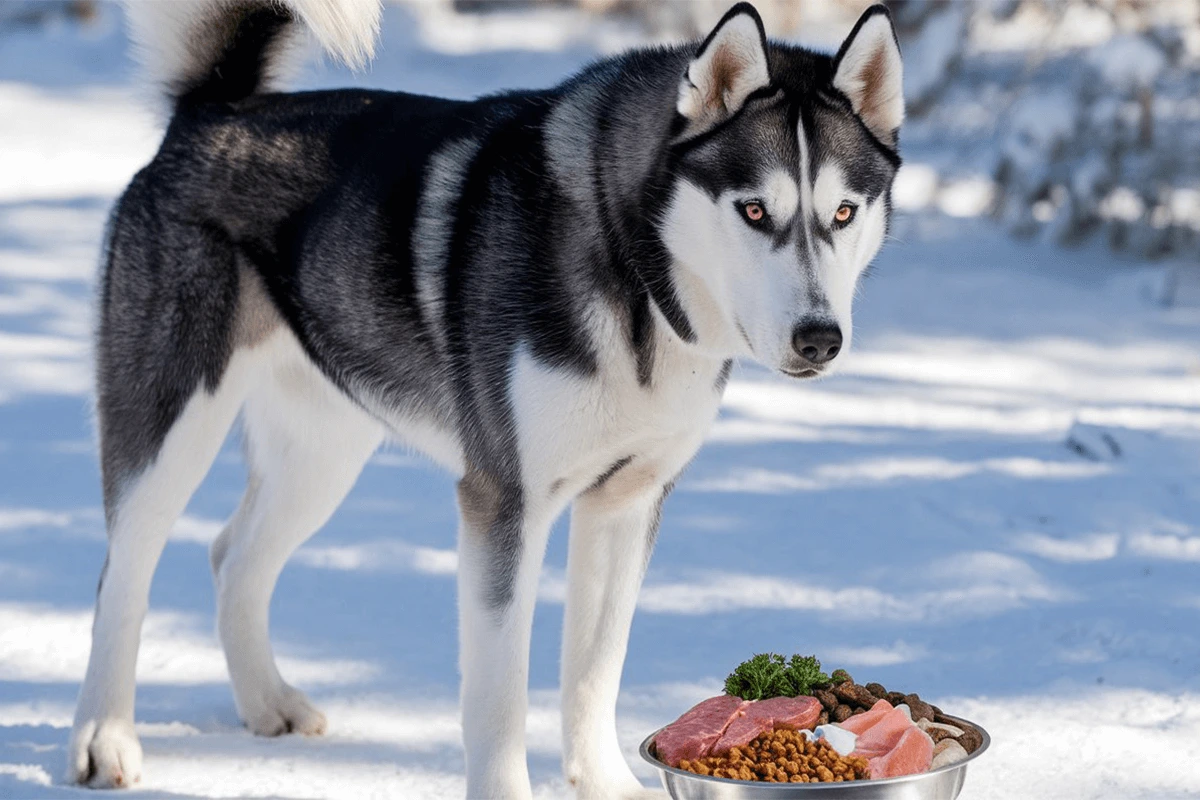Choosing the best dog food for a Siberian Husky plays a crucial role in keeping this energetic and hardworking breed strong, healthy, and active. Huskies have unique dietary needs because of their high energy levels, fast metabolism, and history as sled dogs bred for endurance. Feeding them the right food ensures they maintain their muscular build, thick coat, and overall vitality.
Many Husky owners struggle to find the perfect balance between protein, fats, and essential nutrients. Some dogs thrive on high-protein dog food, while others do better with a grain-free diet or a mix of dry and raw food. Understanding their nutritional requirements helps prevent common issues like digestive problems, food allergies, or weight fluctuations.
This guide will provide expert tips to help you choose the best diet for a Siberian Husky. You’ll learn about the top food options, feeding schedules, vet recommendations, and essential nutrients that support your Husky’s well-being. By the end, you’ll have a clear plan to keep your Husky happy, healthy, and full of energy every day.
Understanding the Nutritional Needs of Siberian Huskies
High Energy Requirements
Siberian Huskies are one of the most energetic dog breeds, originally bred to pull sleds over long distances in harsh Arctic conditions. Their high energy levels mean they need a diet packed with nutrient-dense food that provides sustained fuel throughout the day. Unlike some breeds that can handle lower-calorie diets, Huskies require food that delivers the right balance of protein, healthy fats, and complex carbohydrates to maintain endurance and prevent fatigue.
Feeding a Husky the wrong type of food can lead to sluggishness, muscle loss, or even weight issues. Active Huskies burn calories quickly, so their diet should support their fast metabolism. Whether they are working dogs, hiking companions, or just playful pets, they need high-quality food that meets their energy-boosting requirements.
To keep up with their active lifestyle, Huskies thrive on foods that provide slow-releasing energy rather than fillers that lead to energy crashes. Whole foods like lean meats, fish, sweet potatoes, and brown rice offer steady energy throughout the day. Avoiding cheap fillers like corn, wheat, or soy helps prevent bloating and digestive discomfort. A well-balanced diet ensures that your Husky stays energetic, focused, and ready for adventure, whether they are running, playing, or training.
Protein-Rich Diet
Protein plays a crucial role in a Siberian Husky’s diet, helping maintain strong muscles, support healthy growth, and fuel their daily activities. Since Huskies are highly active, they require a high-protein dog food that includes premium sources like chicken, beef, fish, or lamb. Unlike lower-energy breeds, Huskies depend on protein to sustain their endurance, repair muscle tissues, and keep their bodies in peak condition.
When selecting food, look for options with at least 25-30% protein content to ensure your Husky gets enough nutrients for muscle strength and overall health. Avoid dog foods that use low-quality meat by-products or fillers, as they don’t provide the essential amino acids needed for optimal performance. A protein-rich diet keeps your Husky lean, energetic, and ready for adventure.
Since Huskies naturally have a lean body structure, they don’t store excess fat the way some other breeds do. This makes it even more important to feed them high-quality proteins rather than foods packed with unnecessary carbohydrates. Protein sources like salmon, turkey, and duck also provide additional nutrients like B vitamins, which contribute to metabolism and sustained energy levels. If your Husky is highly active or participates in sports, increasing their protein intake can help with muscle recovery and endurance.
Omega Fatty Acids
A Husky’s thick, double-layered coat is one of its most distinctive features, and omega fatty acids play a key role in keeping it healthy and shiny. These essential fats, commonly found in fish oil, salmon, flaxseed, and certain poultry fats, help reduce shedding, prevent dry skin, and support overall coat health.
Besides improving skin and fur quality, omega-3 and omega-6 fatty acids also boost brain function, reduce inflammation, and promote heart health. Since Huskies are prone to joint issues later in life, adding omega-rich foods to their diet can help support mobility and keep them active for years to come. Choosing dog food rich in omega fatty acids ensures that your Husky’s coat stays vibrant while keeping their body in top shape.
Huskies also face harsh weather conditions due to their thick coat, and omega fatty acids help maintain their skin’s moisture balance. Dry air, cold climates, and frequent shedding can lead to itchiness and irritation, but omega-rich diets help prevent these issues. Foods containing natural fish oils or flaxseed not only improve skin and coat health but also contribute to overall immune function. If your Husky experiences excessive shedding, dull fur, or dry patches, increasing their intake of omega fatty acids can lead to noticeable improvements.
By ensuring your Husky gets enough omega-3 and omega-6 fatty acids, you’re not only enhancing their coat and skin health but also supporting their cognitive function, heart health, and overall well-being. Whether you choose dog food that already includes these nutrients or add supplements like fish oil to their meals, a diet rich in omega fatty acids keeps your Husky looking and feeling their best.
Best Dog Food Options for Siberian Huskies
Best Dry Dog Food for Huskies
Siberian Huskies need a well-balanced diet to maintain their energy levels and muscle health. The best dog food for Siberian Husky should contain high-quality protein, healthy fats, and essential nutrients. Look for kibble that lists real meat like chicken, beef, lamb, or salmon as the primary ingredient. These proteins support muscle development and keep Huskies active.
Huskies also need omega fatty acids to maintain a shiny coat and healthy skin. Ingredients like fish oil and flaxseed provide these essential nutrients. Avoid kibble that contains corn, wheat, soy, or artificial additives, as these fillers offer little nutritional value and may cause digestive issues. Instead, choose options with sweet potatoes, brown rice, or peas, which supply complex carbohydrates for sustained energy.
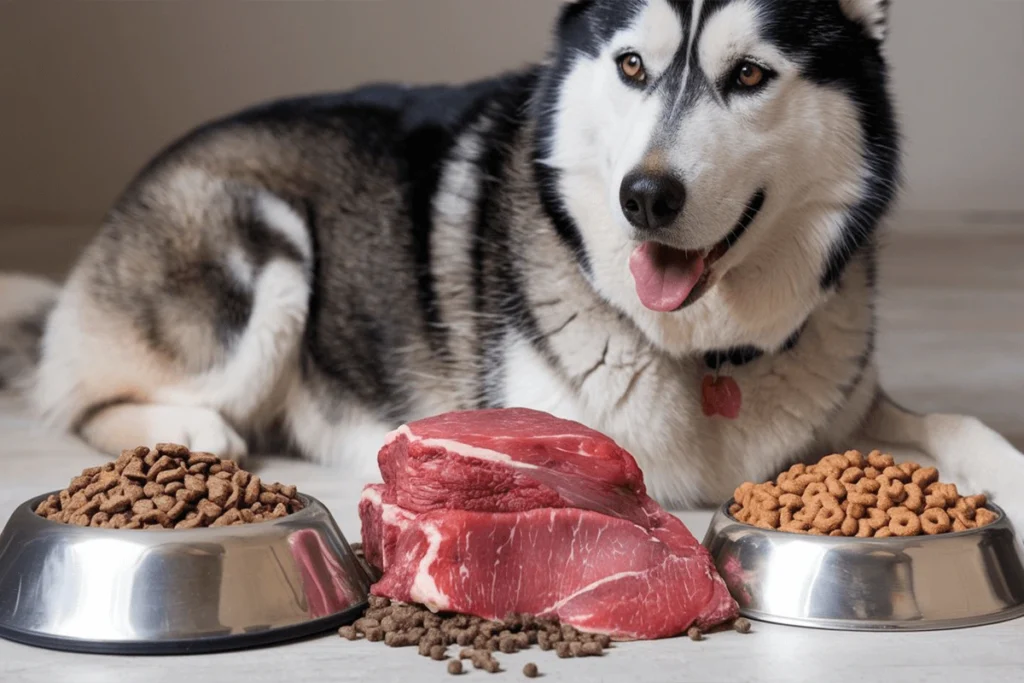
Crunchy kibble promotes dental health, reducing plaque buildup and supporting strong teeth. Some high-quality dry foods also include probiotics and fiber to improve digestion. Since Huskies can be picky eaters, selecting a highly palatable kibble with natural flavors ensures they get the nutrition they need.
The best dry dog food for Huskies should provide complete and balanced nutrition while being easy to digest. Feeding high-quality kibble ensures your Husky remains strong, energetic, and healthy. Always check the ingredients and choose brands with premium protein sources, healthy fats, and essential vitamins for optimal health.
Grain-Free Food for Huskies
Some Huskies have sensitive stomachs and benefit from a grain-free diet. The best dog food for Siberian Husky without grains eliminates common allergens like corn, wheat, and soy, which can cause digestive upset or skin issues. If your Husky suffers from allergies, switching to grain-free food may help.
Grain-free dog food replaces grains with nutrient-rich alternatives such as sweet potatoes, lentils, chickpeas, or peas. These ingredients provide sustained energy while being easy to digest. High-protein formulas that include bison, turkey, duck, or salmon support muscle strength and endurance.
A grain-free diet also contains omega fatty acids to promote a soft, healthy coat and reduce shedding. These essential nutrients come from fish oil, flaxseed, or chia seeds. While grain-free food is beneficial for some Huskies, not all require it. If your Husky digests whole grains like brown rice or oats without issues, there’s no need to eliminate them.
When selecting grain-free food, ensure it contains balanced nutrition. Some lower-quality grain-free options use excessive starch, which can lead to weight gain or nutritional imbalances. Always choose high-protein, nutrient-dense formulas to support your Husky’s active lifestyle. Consulting a vet can help determine if a grain-free diet is the best choice for your dog.
Raw Diet for Siberian Huskies
A raw diet is an alternative feeding method that provides Huskies with unprocessed, natural ingredients. The best dog food for Siberian Husky in raw form includes raw meat, organ meat, bones, and vegetables to ensure a complete and balanced diet. Many owners believe raw feeding improves digestion, coat health, and overall energy levels.
A well-balanced raw meal should consist of:
- Muscle Meat (chicken, beef, lamb, turkey, or fish) for protein and energy
- Organ Meat (liver, kidney, heart) for essential vitamins and minerals
- Raw Bones (chicken wings, turkey necks) for calcium and dental health
- Vegetables & Fruits (carrots, spinach, blueberries) for fiber and antioxidants
Raw feeding eliminates artificial additives and preservatives found in commercial dog food. It also provides natural hydration, which benefits kidney function. Many Huskies on raw diets experience smaller stools, fewer allergies, and improved skin and coat health.
However, raw feeding requires careful preparation and proper handling to avoid bacterial contamination. A poorly balanced raw diet can lead to nutritional deficiencies. Some owners follow structured plans like Prey Model Raw (PMR) or Biologically Appropriate Raw Food (BARF) diets to ensure proper nutrient intake.
Before switching to raw, consult a vet to create a nutritionally complete meal plan that meets your Husky’s needs.
Expert Tips on Feeding Your Siberian Husky
Portion Control & Feeding Schedule
Feeding a Siberian Husky the right portion size is essential for maintaining a healthy weight and energy levels. The best dog food for Siberian Husky should be given in appropriate amounts based on their age, activity level, and metabolism. Overfeeding can lead to obesity, while underfeeding may cause fatigue and muscle loss.
Huskies have efficient metabolisms and require smaller portions compared to other breeds of similar size. Most adult Huskies do well with two meals per day, while puppies need three to four smaller meals to support growth. Feeding at the same times daily helps regulate digestion and prevents overeating.
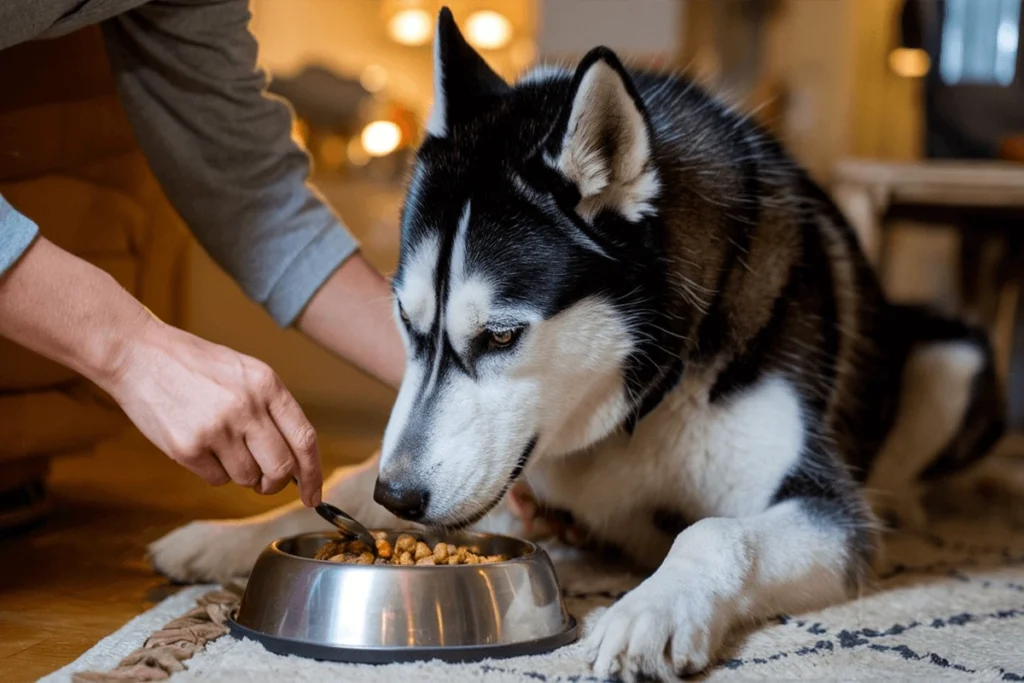
The portion size depends on the food’s caloric density and your Husky’s exercise routine. Highly active Huskies need more calories than those with a sedentary lifestyle. Always check the feeding guidelines on the dog food label and adjust portions based on weight and activity levels. Regularly monitoring their body condition ensures they stay in peak shape.
Mixing Wet & Dry Food
Combining wet and dry food is a great way to enhance nutrition, improve digestion, and make meals more appealing. The best dog food for Siberian Husky can be served in different textures to keep mealtime interesting and encourage picky eaters to finish their food.
Wet food provides higher moisture content, which helps keep Huskies hydrated and supports kidney health. It is also easier to chew, making it a good option for older Huskies or those with dental problems. Dry food, on the other hand, helps clean teeth, strengthen jaw muscles, and provide essential nutrients in a concentrated form.
To mix wet and dry food, start with a 75:25 ratio of dry to wet food and adjust based on your Husky’s preference. Ensure both foods are nutritionally balanced to meet their dietary needs. Mixing also prevents boredom and can help transition your dog to a new diet if needed. Always choose high-quality wet and dry food that complements each other without adding unnecessary fillers or preservatives.
Avoiding Harmful Ingredients
Not all dog foods are created equal, and some contain harmful ingredients that can negatively affect a Husky’s health. The best dog food for Siberian Husky should be free from artificial additives, fillers, and low-quality by-products that offer little nutritional value.
Avoid ingredients like corn, wheat, and soy, which can cause allergies and digestive issues. Stay away from artificial preservatives like BHA, BHT, and ethoxyquin, as these chemicals have been linked to health risks. Artificial colors and flavors provide no benefits and may trigger allergic reactions.
Meat by-products and low-quality protein sources should also be avoided. Instead, look for foods with real meat as the first ingredient to ensure your Husky gets the protein needed for muscle maintenance and energy. Excess salt and sugar should be limited, as they contribute to obesity and other health problems.
Reading ingredient labels carefully helps you choose high-quality, nutritious food that keeps your Husky healthy. Always prioritize foods with natural ingredients, essential vitamins, and high-quality protein sources to support your dog’s long-term well-being.
Veterinary Recommendations for a Healthy Diet
Choosing a Large-Breed Dog Food
Siberian Huskies may not be as large as some giant breeds, but they still benefit from formulas designed for large-breed dogs. The best dog food for Siberian Husky should provide the right balance of protein, fat, and essential nutrients to support their active lifestyle. Large-breed formulas often contain controlled calcium and phosphorus levels to promote strong bones and joints.
Huskies have lean, muscular bodies and require high-quality protein sources like chicken, beef, fish, or lamb to maintain muscle mass. The fat content should be moderate, providing healthy fats like omega-3 and omega-6 to support skin, coat health, and sustained energy. Since Huskies are prone to digestive sensitivities, large-breed formulas with probiotics and fiber can improve gut health.
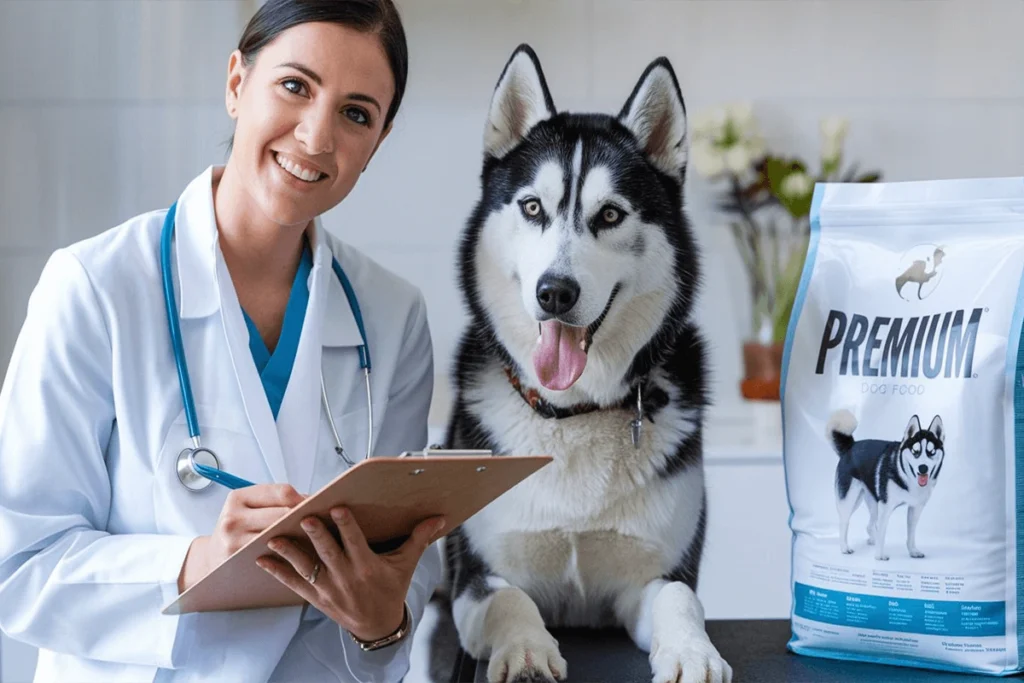
Kibble size also matters when choosing large-breed dog food. Larger kibble pieces encourage chewing and slower eating, which helps prevent digestive issues like bloating. Look for foods with glucosamine and chondroitin, which support joint health and mobility. A well-balanced large-breed formula ensures Huskies get the nutrition they need without unnecessary fillers or additives.
Energy-Boosting Diets
Siberian Huskies are highly energetic dogs that require fuel-rich diets to sustain their activity levels. The best dog food for Siberian Husky should provide high-quality proteins, healthy fats, and complex carbohydrates to support endurance and stamina.
Proteins are the foundation of an energy-boosting diet. Look for foods with at least 25-30% protein content, sourced from real meat, fish, or poultry. These proteins help maintain muscle mass and recovery after exercise. Healthy fats like fish oil, chicken fat, and flaxseed provide sustained energy and promote brain function.
Complex carbohydrates play a vital role in energy production. Ingredients like sweet potatoes, brown rice, and lentils provide slow-burning fuel, keeping Huskies energized throughout the day. Avoid foods with excessive fillers like corn and wheat, which offer little nutritional value.
Feeding an energy-dense diet ensures Huskies remain active, alert, and ready for adventure. If your Husky participates in high-intensity activities like sledding or running, you may need to increase calorie intake to match their energy demands. Always monitor weight and adjust portions based on activity level.
Signs of Nutritional Deficiencies
A poor diet can lead to nutritional deficiencies, affecting a Husky’s overall health and performance. The best dog food for Siberian Husky should provide all essential vitamins, minerals, and macronutrients to prevent common health issues. Recognizing deficiency signs early helps in adjusting the diet before serious problems arise.
One common sign of poor nutrition is a dull or brittle coat. A lack of omega fatty acids can lead to excessive shedding, dry skin, and irritation. Adding foods rich in fish oil, flaxseed, or chicken fat can improve coat health.
Low energy levels or lethargy often indicate insufficient protein or calorie intake. If your Husky seems less active or tires quickly, consider increasing protein-rich foods like chicken, beef, or fish. Weak muscles or slow recovery after exercise can signal a protein or amino acid deficiency.
Digestive issues like diarrhea, constipation, or bloating can result from poor-quality ingredients, lack of fiber, or food intolerances. Huskies need probiotics and digestible fiber sources like pumpkin, brown rice, or sweet potatoes for gut health.
Frequent infections, slow wound healing, or a weak immune system may indicate vitamin and mineral deficiencies. A well-balanced diet with antioxidant-rich fruits and vegetables like blueberries, carrots, and spinach helps boost immunity.
Monitoring these signs ensures your Husky stays healthy and active. If deficiencies persist, consult a vet to adjust the diet or consider supplements to meet nutritional needs.
Final Thoughts & Best Picks for Husky Owners
Summary of Key Takeaways
Feeding a Siberian Husky the right diet is essential for maintaining energy levels, muscle health, and overall well-being. The best dog food for Siberian Husky should include high-quality protein, healthy fats, and essential nutrients to support their active lifestyle. Proper portion control, a balanced feeding schedule, and avoiding harmful ingredients ensure optimal health.
Huskies thrive on protein-rich diets that include real meat as the first ingredient. Omega fatty acids from fish oil and flaxseed support a healthy coat and skin. Whether feeding dry, wet, grain-free, or raw food, owners should prioritize nutrient-dense options without fillers, artificial additives, or low-quality by-products.
Monitoring signs of nutritional deficiencies, choosing large-breed formulas, and providing energy-boosting diets help keep Huskies strong and healthy. Combining digestible carbohydrates, probiotics, and essential vitamins ensures proper digestion and immune support.
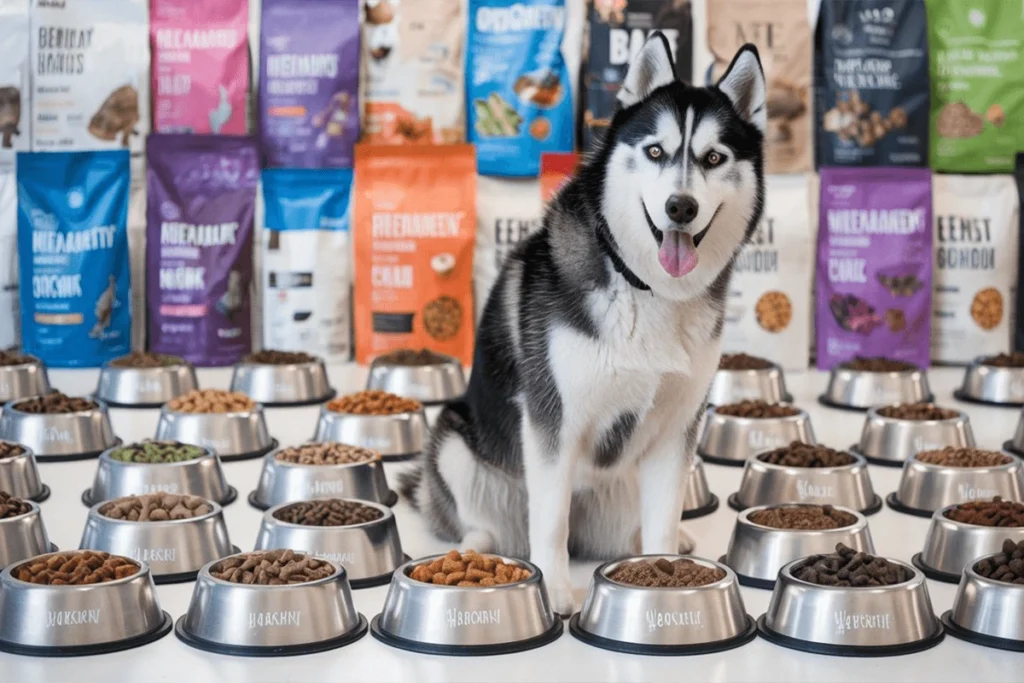
Recommended Dog Food Brands Based on Expert Insights
Experts recommend several high-quality dog food brands that meet the unique needs of Huskies. The best dog food for Siberian Husky should come from trusted brands that prioritize real ingredients, balanced nutrition, and expert formulation. Some top-rated options include:
- Orijen Original – High-protein formula with biologically appropriate ingredients
- Blue Buffalo Wilderness – Grain-free recipe with real meat and antioxidant-rich vegetables
- Taste of the Wild High Prairie – Protein-rich diet with roasted meats and probiotics
- Wellness CORE RawRev – High-protein kibble with freeze-dried raw pieces
- Merrick Grain-Free Texas Beef & Sweet Potato – Nutrient-dense, grain-free option with healthy fats
- Nutro Ultra Large Breed – Balanced diet with premium protein and superfoods for immune health
Each of these brands offers high-quality proteins, essential nutrients, and digestive support to ensure Huskies stay active and healthy. Owners should choose a brand that aligns with their dog’s specific dietary needs, preferences, and activity level.
Encouraging Readers to Consult a Vet for Personalized Feeding Advice
Every Husky has unique nutritional needs, and the best dog food for Siberian Husky may vary based on age, activity level, metabolism, and health conditions. While expert recommendations provide a strong foundation, consulting a veterinarian or canine nutritionist ensures a diet tailored to your dog’s specific requirements.
Vets can help identify food allergies, digestive sensitivities, or special dietary needs that require adjustments in portion sizes or nutrient intake. They also guide owners on raw diets, weight management, and supplement recommendations for optimal health.
A vet’s advice is particularly valuable when transitioning to a new food, dealing with health concerns like obesity or joint issues, or ensuring a Husky gets the right balance of proteins, fats, and carbohydrates. Regular checkups and discussions about diet contribute to a long, healthy, and active life for your Husky.
Is Beef Dog Food Good For your Dog? Lets Find Out!
Discover The Small Breed Dog Food: The Ultimate Guide for a Healthy & Happy dog.
Find Out The Best wholesome dog food in This Article!
Find The Some Good Stuff For your Dog Here on PetMD Official
